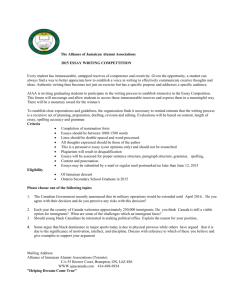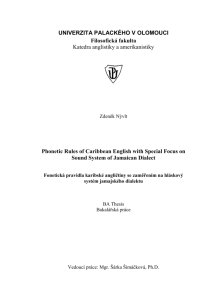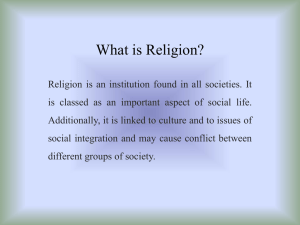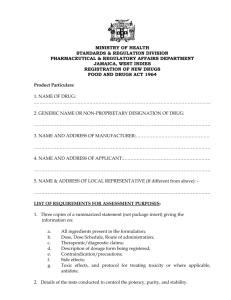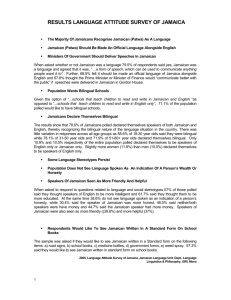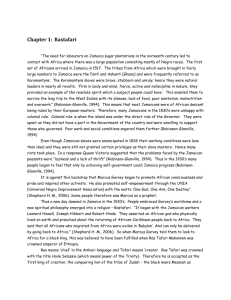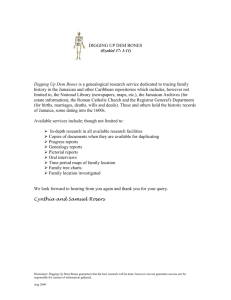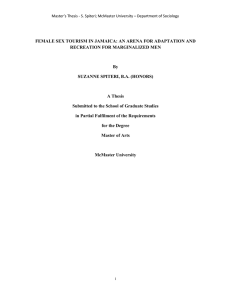The Teacher the School and The Society Course Outline
advertisement
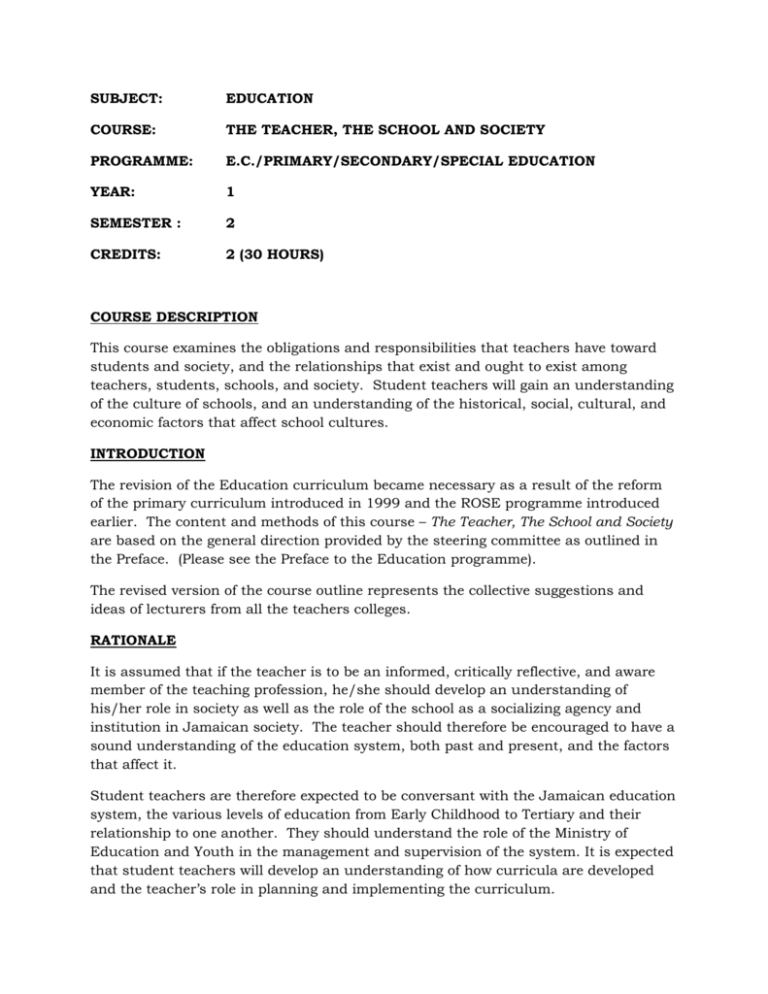
SUBJECT: EDUCATION COURSE: THE TEACHER, THE SCHOOL AND SOCIETY PROGRAMME: E.C./PRIMARY/SECONDARY/SPECIAL EDUCATION YEAR: 1 SEMESTER : 2 CREDITS: 2 (30 HOURS) COURSE DESCRIPTION This course examines the obligations and responsibilities that teachers have toward students and society, and the relationships that exist and ought to exist among teachers, students, schools, and society. Student teachers will gain an understanding of the culture of schools, and an understanding of the historical, social, cultural, and economic factors that affect school cultures. INTRODUCTION The revision of the Education curriculum became necessary as a result of the reform of the primary curriculum introduced in 1999 and the ROSE programme introduced earlier. The content and methods of this course – The Teacher, The School and Society are based on the general direction provided by the steering committee as outlined in the Preface. (Please see the Preface to the Education programme). The revised version of the course outline represents the collective suggestions and ideas of lecturers from all the teachers colleges. RATIONALE It is assumed that if the teacher is to be an informed, critically reflective, and aware member of the teaching profession, he/she should develop an understanding of his/her role in society as well as the role of the school as a socializing agency and institution in Jamaican society. The teacher should therefore be encouraged to have a sound understanding of the education system, both past and present, and the factors that affect it. Student teachers are therefore expected to be conversant with the Jamaican education system, the various levels of education from Early Childhood to Tertiary and their relationship to one another. They should understand the role of the Ministry of Education and Youth in the management and supervision of the system. It is expected that student teachers will develop an understanding of how curricula are developed and the teacher’s role in planning and implementing the curriculum. Finally, student teachers should become aware of the rules, regulations and ethical guidelines that govern the teaching profession in Jamaica. After completing this course, student teachers should have a beginning understanding of what it means to be a professional teacher. STANDARDS After completing this course students should: 1. Understand the organization and functions of the education system as a major institution in Jamaica society. 2. Understand the role of the teacher in the Jamaican education system. 3. Appreciate the political, economic, social and cultural factors that influence the role of the teacher. PEDAGOGICAL ORIENTATION OF THE COURSE The philosophical bases on which the new Teacher Education Programmes are built will require new approaches to the delivery of concepts and content. Lecturers are therefore expected to practice more participatory procedures giving their students opportunities for reflection on their own experiences, which they may use to build new knowledge and competencies. The course is designed to continue the process of reflection and knowledge building about self, teaching and learning, that were started with the course outline a guide with suggested readings, materials and activities that can be used as a resource. The units are sequenced to facilitate lecturers in helping their first year students move away from the traditional type of ‘content transmission’ they have been accustomed to, and to become progressively comfortable with the trust towards imparting knowledge in a more collaborative and participatory way. Students should be encouraged to build knowledge that represents a balanced blend between concrete, factual information as well as knowledge derived from reflections, deliberations and discussions about their own experiences and the shared experiences of lecturers, colleagues, other teachers, members of school communities, and published public opinions. OVERVIEW OF COURSE CONTENT The course is divided into two units as follows: UNIT 1 (12 HOURS) The Jamaican Education System • • • • Historical overview of the Jamaican education system Organization of the Jamaican education system Management of the Jamaican education system Delivery of the education system’s goals through its curricula UNIT 2 (18 HOURS) The role of the Teacher in the Jamaican Education System • The work –Roles/Responsibilities/Rights of the Jamaican teacher (Issues of Accountability): - The teacher as an employee: The Code of Regulations - The teacher as a professional: Code of Ethics (JTA, JTC) - The teacher as an agent of change • Factors that affect the work of the Jamaican teacher: - Institutional/School cultures - School Community Relationships - Societal expectations of teachers - The personal/religious/political views of the teacher - Professional Organizations and Affiliations UNIT 1 The Jamaican Education System Instructional Objectives: 1. Identify and briefly describe the major phases of Jamaica’s educational history from 1835 to the present 2. Identify and describe the different levels and types of education offered in Jamaica 3. Explain the role of the Ministry of Education and Youth in planning, managing, supervising and supporting the education system 4. Explain the concepts: Curriculum; formal curriculum; informal curriculum; hidden curriculum 5. Identify the curricula used at various levels of the education system 6. Provide an overview of the rationale and goals of these curricula 7. Evaluate and discuss the advantages and/or disadvantages of these various curricula 8. Explain the role of various stakeholders in the planning, development and implementation of curricula used in Jamaica CONTENT 1. An historical overview of education and teacher education in Jamaica. 2. Levels of the education system;- age groups of students at each level; accessing each level - Early Childhood (Up to 6 years) - Primary 6 – 12 years) - Secondary (12 – 18 years) - Post secondary - Tertiary -Associate degrees -undergraduate degrees -graduate degrees 3. Types of education available in Jamaica - Public -Private -Vocational -Technical -Continuing Education -Religious/Theological -Offshore -Online -Special Education -Performing Arts 4. Role of the MOEY and other agencies (National Education Inspectorate, Jamaica Teaching Council) in the planning, management, supervision and support of the education system. 5. Concepts of Curriculum; formal curriculum; informal curriculum; hidden curriculum 6. Curriculum development and implementation - How a curriculum is developed - Identification of Stakeholders in the process of curriculum development – MOEY; policy makers; consultants; private sector interests; church; university researchers; local and foreign funding agencies; community; parents; teachers; students 7. Curricula used at various levels of the education system UNIT 2 The Role of the Teacher in the Jamaican Education System Instructional Objectives: After completing Unit 2 students should be able to: 1. Identify and describe the roles and responsibilities of Jamaican teachers as set out in the Code of Regulations 2. Use the Code of Regulations as a tool for researching and improving their understanding of the job/rights of the Jamaican teacher 3. Discuss what it means to be a member of the teaching profession as outlined by the Jamaica Teachers’ Association, JTC Code of Ethics, National Teaching Standards. 4. Explain the concept of teacher as a professional 5. Identify and discuss factors that impact the work of Jamaican teachers 6. Discuss what it means to be a member of the teaching profession in terms of meeting society’s expectations 7. Discuss what it means to be a member of the teaching profession in terms of one’s personal attitudes, beliefs and values 8. Articulate a personal point of view about their own future role as teachers in the Jamaican education system Content 1. Concepts of roles, responsibilities, rights 2. Roles, responsibilities and rights of Jamaican teachers as set out in the Code of Regulations 3. Concept of a professional and professionalism 4. What makes a teacher a professional – Academic qualifications? Subject knowledge? Getting results in the classroom: Observing regulations? Dressing professionally? Being a disciplinarian? Displaying moral, ethical behavior? Commitment to one’s students? Caring and concern for students? Some, all or none of these criteria? 5. Guidelines for professional behavior of teachers as provided in the JTA, JTC, Code of Ethics, National Teaching Standards 6. Factors that affect the work of the Jamaican teacher: o Institutional/School cultures o What is School Culture? To what extent do various characteristics of a school’s culture such affect the work of the teacher, such as? -school type – public, private, religious, secular -school climate – traditional, progressive, strict, punitive, disciplined, orderly, chaotic, clean, dirty, warm, supportive, uncaring, academically competitive oriented to athletic achievements; laissez-faire; demotivated, religious -relationships between and among administration, the school board, staff, parents, students -teaching cultures – views about teaching and learning and approaches to teaching -student cultures – valuing academic achievement, athletic achievement, achievement in the arts; participation in social groups, community projects; valuing crime, violence -student subcultures – gangs, religious, political affiliations -school traditions, daily routines and rituals -composition of teaching and student bodies according to race, gender, religion, SES, neighbourhood - - School Community Relationships *parent – teacher associations *community supports – Churches; voluntary organizations *private sector inputs Societal Expectations of teachers Professional Organization and Affiliations – membership in the JTA; membership in voluntary groups – Kiwanis, Rotary, Girl Guides, Scouts, religious groups, social clubs The personal/religious/political views of the teacher and how these influence his/her work. ASSESSMENT The scheme for assessment is as follows: A. Course Work = 50% Students will submit two pieces of course work for assessment – a scrapbook and a group presentation. B. Final Examination = 50% Section A 10 short answer questions (20%) Section B Analysis of 2 Case Scenarios (15%) C. One Essay (10%) Course Work Assignment 1 Scrapbook = 30% A scrapbook of 8 – 10 newspaper clippings about education in Jamaica. These do not have to be Unit specific. The clippings should be about education in Jamaica such as reports of current events; Ministry announcements; reports on parliamentary proceedings re education; letters to the editor; editorials; think pieces, reviews of books on education. The objectives for this assignment are to help students: - Become aware and informed about public conversations re education - Develop skills of keeping current re educational issues - Foster critical thinking and reflection about current educational issues - Develop skills for formulating and articulating opinions about current educational issues - Improve writing skills Guidelines for assessment - - - Students should submit clear copies of clippings that are properly referenced to indicate source, date of publication or date of retrieval. Students should be permitted to retrieve articles from online publications of newspaper Each scrapbook entry should neatly mounted Each scrapbook entry should be accomplished by three or four paragraphs that: -summarize the article -place the article in context -give the student’s views on the issues covered in the article Scrapbooks do not have to be works of art, but they should be neat with consistent formatting, borders, page numbers, and clear titles and labels. SAMPLE SCRAPBOOK ENTRY Roxanne Smith The Teacher, the School and Society My Scrapbook Entry Number 3 Clipping that reports the late postponed opening of Schools because of Hurricane Dean and postponed National elections. (With or without picture) Source: Daily Gleaner, August 23, 2007. Section A. p.1 This article reports that MOEY had decided to postpone the opening of schools until Monday, September 10, 2007. The MOEY said this was necessary because of widespread damage to several schools due to the passage of Hurricane Dean. The move was also prompted by the postponement of the national elections. Ministry officials explained that if schools reopened before the elections it would cause more disruption, since many schools were to be used as polling stations. The MOEY promised that the school year would be extended to make up for time lost. The article reported on a situation that added to the general confusion that we as a country faced in August last year. People were already upset about the effect of the holding of the elections at that time when everyone is usually busy preparing for going back to school. Nobody was sure how to plan for the following weeks since many people had damaged homes and were still without light and water. If I had read this article a year earlier when I was still in high school, I would have been so happy that school was opening late. But as a future teacher I understood from the teacher’s point of view that this could be very disruptive for students and schools. This would be more so for those students who had to face examinations like GSAT and CSEC because their preparation time would be shorter. I also realized that many schools would be even more affected if they had damage from the hurricane and might have to open even later. I was concerned as well that postponed elections would cause even more disruption if they were called for after the opening of schools. I really hope that no more hurricanes come our way for a long time again. ASSIGNMENT 2 Group Presentation = 20% Students should be organized into groups of three or four to: Prepare and present a position paper on a course related topic OR Prepare and participate in a debate on a course related topic. Examples of topics: • • • • • • Is Teaching really a profession? Teachers should be more involved in the process of curriculum development The Code of Regulations is to restrictive The Code of Ethics makes unreasonable demands of teachers The teacher should be an agent of change rather than and agent of conformity Curriculum innovations are more disruptive that helpful The objectives for this assignment are for students to: • • Critically reflect and think about course related topics Develop research skills • • • • Develop reasoning skills Develop oral presentation skills Develop writing skills Learn how to work in groups Guidelines for Assessment Group presentation should include an oral and a written component. They should demonstrate that students have: • • • • • • • • Carried out a reasonable amount of research on their topic Referenced all cited research Taken a reasonable position on their topic Developed and presented reasonable points to support their position Included sound evidence to support their position Reached and presented a reasonable conclusion Quality of the written presentation Evidence of good group collaboration It is recommended that various forms of assessment be used such as assessment by the lecturer; student peer assessment of presenting; student self assessment; student assessment of their group work; short reflective pieces about the experience of working in a group. Useful References There is no prescribed text for this course. The following references are offered as possible sources of information. Anglin, R. (2000). Education and Society. An Introduction . 2nd Edition Evans, Hyacinth. (2001). Inside Jamaican Schools Planning Institute of Jamaica. Economic and Social Surveys. (Annual Publications) Whyte, Millicent (2002). The Teacher as a Professional in a Developing Country. Institute of Education Publication Series (Available: Institute of Education, School of Education Publications Unit. UWI, Mona). Caribbean Journal of Education (Available: Institute of Education, School of Education Publications Unit. UWI, Mona). Code of Regulations. MOEY Code of Ethics. Jamaican Teachers Association There are many factors and sources available at the Documentation centre of the School of Education, UWI. Mona

